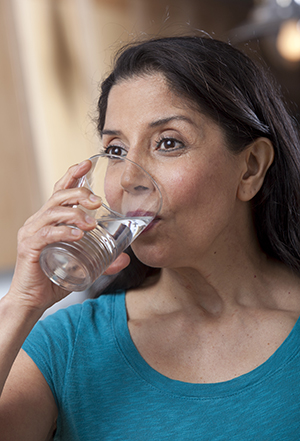Nutrition During Chemotherapy
During chemotherapy, the energy you get from a healthy diet can help you rebuild normal cells. It can also help you keep up your strength and fight infection. As a result, you may feel better and be more able to cope with side effects. Ask your healthcare provider about your nutrition needs. They may give you a referral to talk with a dietitian.
Drink plenty of fluids
-
Fluids help the body make urine and decrease constipation. They help prevent kidney and bladder problems. Drinking plenty of fluids is key in replacing fluids lost from vomiting and diarrhea.
-
Try water, unsweetened juices, and other flavored drinks without caffeine. They prevent dehydration and help flush toxins from the body.
 |
| Drink plenty of liquids, such as water. |
Get enough calories
-
Calories are fuel. The body uses this fuel to do all its functions, including healing.
-
It’s OK to be lean, but be sure you are not underweight. If you are, try eating more calories.
-
Eat calorie-dense foods such as avocados, peanut butter, eggs, and ice cream.
-
If you need extra calories, add butter, gravy, and sauces to foods (if tolerated).
-
If you don't need the extra calories, try to limit foods that are fried, greasy, or high in fat or added sugar.
Eat protein, fruits, and vegetables
-
Protein builds muscle, bone, skin, and blood. It helps your body heal and fight infection. It also helps boost your energy level.
-
Good protein choices include yogurt, eggs, chicken, fish, lean meats, beans, and peanut butter.
-
Fruits and vegetables are full of important vitamins, minerals, and fiber to help your body work the right way.
-
Try to eat a variety of vegetables, fruits, whole grains, and beans.
-
Ask your healthcare provider about instant protein powder or other supplements.
Healthy eating during treatment
Side effects may make it a little harder to eat well on some days. To help you get the nutrition you need:
-
Be open to new foods and recipes.
-
Eat small portions often and slowly.
-
Have a healthy snack instead of a meal if you are not very hungry.
-
Try eating in a new setting.
-
Do physical activity, such as walking, to help increase your appetite. Try to be active for at least 30 minutes each day.
-
Boost your nutrition by getting the vitamins and minerals you need from fruits, vegetables, and whole grains. Ask your provider about vitamin and mineral supplements if you are not eating well because of side effects.
-
If you live alone and are not up to cooking, ask your provider about Meals on Wheels or other outreach programs.
-
Sometimes it is best to follow your appetite. Eat when you are hungry. But forcing yourself to eat when you are not hungry can make you feel bad. It may make you nauseated. It may even cause you to vomit.
Online Medical Reviewer:
Marianne Fraser MSN RN
Online Medical Reviewer:
Rita Sather RN
Online Medical Reviewer:
Susan K. Dempsey-Walls RN
Date Last Reviewed:
11/1/2023
© 2000-2025 The StayWell Company, LLC. All rights reserved. This information is not intended as a substitute for professional medical care. Always follow your healthcare professional's instructions.